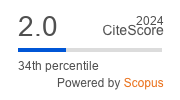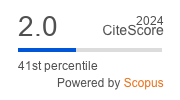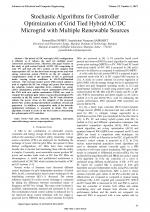| 2/2019 - 7 |
Stochastic Algorithms for Controller Optimization of Grid Tied Hybrid AC/DC Microgrid with Multiple Renewable SourcesNEMPU, P. B. |
| Extra paper information in |
| Click to see author's profile in |
| Download PDF |
Author keywords
fuel cells, heuristic algorithms, microgrid, renewable energy sources, supercapacitors
References keywords
hybrid(17), power(15), energy(15), control(14), microgrid(12), system(9), grid(7), systems(5), strategies(5), operation(5)
Blue keywords are present in both the references section and the paper title.
About this article
Date of Publication: 2019-05-31
Volume 19, Issue 2, Year 2019, On page(s): 53 - 60
ISSN: 1582-7445, e-ISSN: 1844-7600
Digital Object Identifier: 10.4316/AECE.2019.02007
Web of Science Accession Number: 000475806300007
SCOPUS ID: 85066316743
Abstract
The hybrid AC/DC microgrid (MG) configuration is efficient as it reduces the need for multiple power conversions and hence losses. Therefore, this paper focuses on the study of grid assisted hybrid AC/DC MG comprising of solar PV and fuel cell (FC) systems on DC subgrid with supercapacitor (SC) as the short term storage device and wind energy conversion system (WECS) on the AC subgrid. A comprehensive study of the operation of MG is performed under varying system conditions in MATLAB/Simulink software. The real and reactive power (PQ) control scheme is used to regulate the DC bus voltage and power flow between the subgrids. Genetic algorithm (GA), artificial bee colony (ABC) optimization, particle swarm optimization (PSO) and the PSO with new update mechanism (PSOd) are used to compute the optimum gain values of proportional-integral (PI) controller in the PQ control scheme. The SC bank effectively reduces the power stress on the subgrids of the proposed hybrid MG system during intermittent conditions of load and generation. In addition, a comparative study of the heuristic optimization techniques is presented in detail. The ABC algorithm is found to arrive at the best results in determining the optimal gains of PI controller. |
| References | | | Cited By «-- Click to see who has cited this paper |
| [1] X. Liu, P. Wang, P. C. Loh, "A hybrid AC/DC microgrid and its coordination control," IEEE Transactions on Smart Grid, vol. 2, no. 2, pp. 278-286, Jun. 2011. [CrossRef] [Web of Science Times Cited 836] [SCOPUS Times Cited 1158] [2] A. Gupta, S. Doolla, K. Chatterjee, "Hybrid AC-DC microgrid: systematic evaluation of control strategies," IEEE Transactions on Smart Grid, vol. 9, no. 4, pp. 3830-3843, Jul. 2018. [CrossRef] [Web of Science Times Cited 207] [SCOPUS Times Cited 283] [3] F. Nejabatkhah, Y. W. Li, "Overview of power management strategies of hybrid AC/DC microgrid," IEEE Transactions on Power Electronics, vol. 30, no. 12, pp. 7072-7089, Dec. 2015. [CrossRef] [Web of Science Times Cited 658] [SCOPUS Times Cited 876] [4] C. Jin, P. C. Loh, P. Wang, Y. Mi, F. Blaabjerg, "Autonomous operation of hybrid AC-DC microgrids," in IEEE International Conference on Sustainable Energy Technologies (ICSET), Kandy, Sri Lanka, Dec. 2010, pp. 1-7. [CrossRef] [SCOPUS Times Cited 93] [5] P. C. Loh, D. Li, Y. K. Chai, F. Blaabjerg, "Autonomous control of interlinking converter with energy storage in hybrid AC-DC microgrid," IEEE Transactions on Industry Applications, vol. 49, no. 3, pp. 1374-1382, May. 2013. [CrossRef] [Web of Science Times Cited 303] [SCOPUS Times Cited 388] [6] P. C. Loh, D. Li, Y. K. Chai, F. Blaabjerg, "Autonomous operation of hybrid microgrid with AC and DC subgrids," IEEE Transactions on Power Electronics, vol. 28, no. 5, pp. 2214-2223, May. 2013. [CrossRef] [Web of Science Times Cited 528] [SCOPUS Times Cited 718] [7] M. Baharizadeh, H. R. Karshenas, J. M. Guerrero, "An improved power control strategy for hybrid AC-DC microgrids," International Journal of Electrical Power & Energy Systems, vol. 95, pp. 364-373, Feb. 2018. [CrossRef] [Web of Science Times Cited 53] [SCOPUS Times Cited 66] [8] N. Eghtedarpour, E. Farjah, "Power control and management in a hybrid AC/DC microgrid," IEEE transactions on smart grid, vol. 5 no. 3, pp. 1494-1505, May 2014. [CrossRef] [Web of Science Times Cited 464] [SCOPUS Times Cited 600] [9] S. M. Malik, X. Ai, Y. Sun, C. Zhengqi, Z. Shupeng, "Voltage and frequency control strategies of hybrid AC/DC microgrid: a review," IET Generation, Transmission & Distribution, vol. 11, no. 2, pp. 303-313, Jan. 2017. [CrossRef] [Web of Science Times Cited 145] [SCOPUS Times Cited 187] [10] E. Kabalcı, "An islanded hybrid microgrid design with decentralized DC and AC subgrid controllers," Energy, vol. 153, pp.185-199, Jun. 2018. [CrossRef] [Web of Science Times Cited 24] [SCOPUS Times Cited 27] [11] S. K. Ayyappa, D. N. Gaonkar, "Performance analysis of a variable-speed wind and fuel cell-based hybrid distributed generation system in grid-connected mode of operation," Electric Power Components and Systems, vol. 44, no. 2, pp. 142-151, Jan. 2016. [CrossRef] [Web of Science Times Cited 11] [SCOPUS Times Cited 17] [12] T. Ma, M. H. Cintuglu, O. A. Mohammed, "Control of a hybrid AC/DC microgrid involving energy storage and pulsed loads," IEEE Transactions on Industry Applications, vol. 53, no. 1, pp. 567-575, Jan. 2017. [CrossRef] [Web of Science Times Cited 134] [SCOPUS Times Cited 171] [13] A. A. Abdelsalam, H. A. Gabbar, A. M. Sharaf, "Performance enhancement of hybrid AC/DC microgrid based D-FACTS," International Journal of Electrical Power & Energy Systems, vol. 63, pp. 382-393, Dec. 2014. [CrossRef] [Web of Science Times Cited 46] [SCOPUS Times Cited 53] [14] C. K. Sundarabalan, K. Selvi, "Real coded GA optimized fuzzy logic controlled PEMFC based Dynamic Voltage Restorer for reparation of voltage disturbances in distribution system," International Journal of Hydrogen Energy, vol. 42, no. 1, pp. 603-613, Jan. 2017. [CrossRef] [Web of Science Times Cited 33] [SCOPUS Times Cited 42] [15] R. Eberhart, J. Kennedy, "A new optimizer using particle swarm theory," Proceedings of the Sixth International Symposium on Micro Machine and Human Science, IEEE, Nagoya, Japan, Oct. 1995, pp. 39-43. [CrossRef] [16] N. Bigdeli, "Optimal management of hybrid PV/fuel cell/battery power system: A comparison of optimal hybrid approaches," Renewable and Sustainable Energy Reviews, vol. 42, pp. 377-393, Feb. 2015. [CrossRef] [Web of Science Times Cited 111] [SCOPUS Times Cited 144] [17] L. K. Letting, J. L. Munda, Y. Hamam, "Optimization of a fuzzy logic controller for PV grid inverter control using S-function based PSO," Solar Energy, vol. 86, no. 6, pp. 1689-1700, Jun. 2012. [CrossRef] [Web of Science Times Cited 74] [SCOPUS Times Cited 90] [18] D. Fister, I. Fister Jr, I. Fister, R. Safaric, "Parameter tuning of PID controller with reactive nature-inspired algorithms," Robotics and Autonomous Systems, vol. 84, pp. 64-75, Oct. 2016. [CrossRef] [Web of Science Times Cited 58] [SCOPUS Times Cited 76] [19] M. G. Villarreal-Cervantes, J. Alvarez-Gallegos, "Off-line PID control tuning for a planar parallel robot using DE variants," Expert Systems with Applications, vol. 64, pp. 444-454. Dec. 2016. [CrossRef] [Web of Science Times Cited 43] [SCOPUS Times Cited 45] [20] W. Bai, M. R. Abedi, K. Y. Lee, "Distributed generation system control strategies with PV and fuel cell in microgrid operation," Control Engineering Practice, vol. 53, pp.184-193, Aug. 2016. [CrossRef] [Web of Science Times Cited 72] [SCOPUS Times Cited 91] [21] P. GarcÃa-Trivino, A. J. Gil-Mena, F. Llorens-Iborra, C. A. Garcia-Vazquez, L.M. Fernandez-RamÃrez, F. Jurado, "Power control based on particle swarm optimization of grid-connected inverter for hybrid renewable energy system," Energy Conversion and Management, vol. 91, pp. 83-92, Feb. 2015. [CrossRef] [Web of Science Times Cited 53] [SCOPUS Times Cited 66] [22] M. S. Kiran, "Particle swarm optimization with a new update mechanism," Applied Soft Computing, vol. 60, pp. 670-678. Nov. 2017. [CrossRef] [Web of Science Times Cited 89] [SCOPUS Times Cited 111] [23] T. Kalitjuka, "Control of voltage source converters for power system applications," (Master's thesis, Institutt for elkraftteknikk)", 2011. [24] C. Bajracharya, M. Molinas, J. A. Suul, T. M. Undeland, "Understanding of tuning techniques of converter controllers for VSC-HVDC," Nordic Workshop on Power and Industrial Electronics (NORPIE), Espoo, Finland, Jun. 2008, Helsinki University of Technology. [25] T. Vigneysh, N. Kumarappan, "Autonomous operation and control of photovoltaic/solid oxide fuel cell/battery energy storage based microgrid using fuzzy logic controller," International journal of hydrogen energy, vol. 41, no. 3, pp. 1877-1891, Jan. 2016. [CrossRef] [Web of Science Times Cited 118] [SCOPUS Times Cited 130] [26] N. S. Jayalakshmi, D. N. Gaonkar, A. Balan, P. Patil, S. A. Raza, "Dynamic modeling and performance study of a stand-alone photovoltaic system with battery supplying dynamic load," International Journal of Renewable Energy Research (IJRER), vol. 4, no. 3, pp. 635-640, Sep. 2014. [27] O. C. Onar, M. Uzunoglu, M. S. Alam, "Dynamic modeling, design and simulation of a wind/fuel cell/ultra-capacitor-based hybrid power generation system," Journal of power sources, vol. 161, no. 1, pp. 707-722, Oct. 2006. [CrossRef] [Web of Science Times Cited 167] [SCOPUS Times Cited 224] [28] N. S. Jayalakshmi, D. N. Gaonkar, "Maximum power point tracking for grid integrated variable speed wind based DG system with dynamic load," International Journal of Renewable Energy Research (IJRER), vol. 4, no. 2, pp. 464-470, Jun. 2014. [29] T. Back, "Evolutionary algorithms in theory and practice: evolution strategies, evolutionary programming, genetic algorithms," Oxford University Press, Jan. 1996. [30] D. Karaboga, "An idea based on honey bee swarm for numerical optimization," Technical report-tr06, Erciyes university, engineering faculty, computer engineering department. Oct. 2005. Web of Science® Citations for all references: 4,227 TCR SCOPUS® Citations for all references: 5,656 TCR Web of Science® Average Citations per reference: 136 ACR SCOPUS® Average Citations per reference: 182 ACR TCR = Total Citations for References / ACR = Average Citations per Reference We introduced in 2010 - for the first time in scientific publishing, the term "References Weight", as a quantitative indication of the quality ... Read more Citations for references updated on 2025-06-01 17:39 in 160 seconds. Note1: Web of Science® is a registered trademark of Clarivate Analytics. Note2: SCOPUS® is a registered trademark of Elsevier B.V. Disclaimer: All queries to the respective databases were made by using the DOI record of every reference (where available). Due to technical problems beyond our control, the information is not always accurate. Please use the CrossRef link to visit the respective publisher site. |
Faculty of Electrical Engineering and Computer Science
Stefan cel Mare University of Suceava, Romania
All rights reserved: Advances in Electrical and Computer Engineering is a registered trademark of the Stefan cel Mare University of Suceava. No part of this publication may be reproduced, stored in a retrieval system, photocopied, recorded or archived, without the written permission from the Editor. When authors submit their papers for publication, they agree that the copyright for their article be transferred to the Faculty of Electrical Engineering and Computer Science, Stefan cel Mare University of Suceava, Romania, if and only if the articles are accepted for publication. The copyright covers the exclusive rights to reproduce and distribute the article, including reprints and translations.
Permission for other use: The copyright owner's consent does not extend to copying for general distribution, for promotion, for creating new works, or for resale. Specific written permission must be obtained from the Editor for such copying. Direct linking to files hosted on this website is strictly prohibited.
Disclaimer: Whilst every effort is made by the publishers and editorial board to see that no inaccurate or misleading data, opinions or statements appear in this journal, they wish to make it clear that all information and opinions formulated in the articles, as well as linguistic accuracy, are the sole responsibility of the author.



